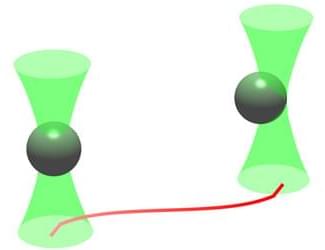Researchers discovered a trick for dragging an object in a fluid with minimal effort, suggesting an optimal strategy for nanorobots.
A research team has demonstrated that the most efficient protocol for dragging a microscopic object through a fluid has an unexpected feature: the variation of the velocity with time after the midpoint of the trip is the reverse of its variation up to the midpoint [1]. This time-symmetry property, the researchers say, can help to identify the most efficient control strategy in a wide variety of micromechanical systems and could improve the operation of tiny machines.
Biomedical engineers are exploring micro-and nanoscale devices that swim through the body under their own power to deliver drugs [2]. Machine-like motion at tiny scales is also common in biology, for instance in the transport of compartments called vesicles by motor proteins inside cells [3]. To understand the energetics of such systems, Sarah Loos of the University of Cambridge and colleagues have studied a simple model of microscale transport. They used optical tweezers—a laser beam that can trap a small particle—to drag a 2.7-micrometer-diameter silica sphere through fluids. “This problem is simple enough to be solved analytically and realized experimentally, yet rich enough to show some fundamental characteristics of optimal control in complex systems,” says Loos. In practice, the device inducing the motion “could be a nanorobot carrying a drug molecule or a molecular motor that pulls or pushes against a microscopic object.”
